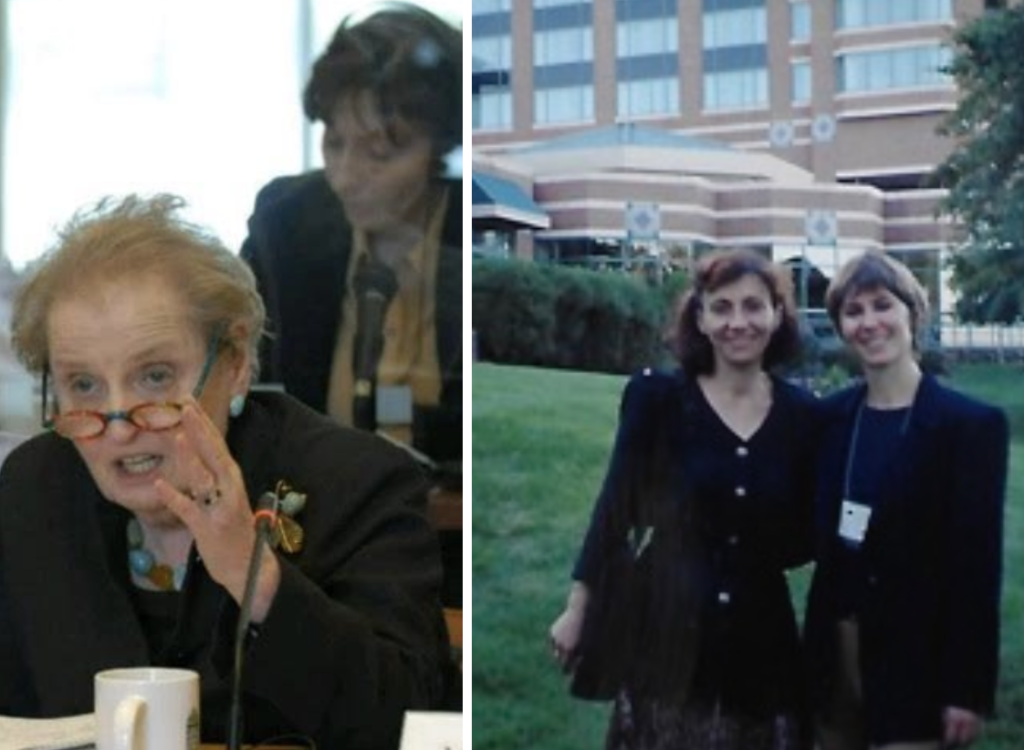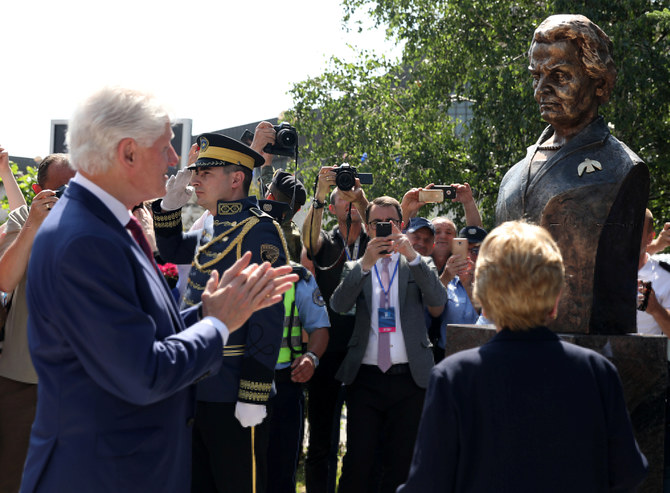

By Rafaela Prifti/
– She was a trailblazer in her service to this country not in spite of her non-American origin but because of it. Madeleine Albright’s figure is projected as an example of what can be achieved in America. Yet her achievements speak more to the purpose she chose to assign to her life as a citizen and woman in the free world than the promise of opportunities.
– Albright’s larger than life figure stands as a role model and an inspiration for Albanians, who have embraced her humanity wholeheartedly.
Madeleine Albright, who made history as the first woman to be Secretary of State, has died at 84.
In 1997, she was the highest-ranking woman in the history of US government which made her fourth in line to the presidency. Like two of her predecessors Henry Kissinger and Zbigniew Brzezinski she would not have been able to fill the role, not being a natural born US citizen as defined in the Constitution. Yes, she had been a refugee of war. Born in Prague in 1937, Albright fled to London with her family after the Nazis invasion of Czechoslovakia in 1939. She came to the US in 1948. She was raised Catholic and only decades later discovered her parents were Jewish and a few of her family members were murdered in the Holocaust.
In light of her bio, Madeleine Albright’s figure is projected as an example of what can be achieved in America. Yet her achievements speak more to the purpose she chose to assign to her life as a citizen and woman in the free world than the offering of opportunities.
In the early 90s when she first served as President Clinton’s Ambassador to the United Nations prior to being the top diplomat of his administration, the dominant foreign policy themes were the aftermath of the collapse of the Soviet Union, including the wars in the former Yugoslavia, the quest for peace between Israel and the Palestinians and the rise of fundamentalist Islam in the years before 9/11.
There is no doubt that Kosovo war is part of Albright’s legacy as a diplomat and politician, with deep implications for the US foreign policy as well as the military alliances particularly NATO. The current and future dynamics of the alliance are dominant topics in view of the month-long Russia’s invasion of Ukraine. President Biden resonated that moment in his tribute to Albright: “As the world redefined itself in the wake of the cold war, we were partners and friends working to welcome newly liberated democracies into NATO and confront the horrors of genocide in the Balkans.”
In the grip of a brutal war raged by a sadistic nationalist like then-Serbia’s President Milosevic, Kosovo’s Albanian population, and perhaps many a-oppressed people, saw in Albright the promise of a free and better future. Madam Secretary of State Albright projected the hope they needed to stand their ground and by her own example encouraged them to dream. It is why Albanians say with certainty that they feel that she understood them.
In 2000, she was the first senior US figure to meet the Russian leader in Moscow. She recalled her impressions of Vladimir Putin in a New York Times column where she laid out an accurate assessment of the events that unfolded afterwards.
As Kremlin was amassing Russian troops at the border, she said in a recent interview that if Putin ordered an invasion of Ukraine, he would make a historic mistake.
Albanians have experienced the cost of a previous mistake by then-Serbian ruler, Slobodan Milosevic and its military forces. The Albanian population had suffered the high costs of an inhumane war in terms of lost human lives, expulsions, refugees, internal displacement, property destruction and more.
There is particular resonance with the over-twenty-years-ago war that ravaged Kosovo and was fueled by the dangerous ideology of a strongman backed by Russia. In her salute to Albright, Hillary Clinton, a successor as secretary of state, echoed the impact of Albright’s work in that particular context: “So many people around the world are alive and living better lives because of her service.”
The very present threat of authoritarianism is the subject of Albright’s last book: Fascism – A Warning. In it, she writes “Democracy is not the easiest form of government.” “It does require attention and participation and carrying out the social contract. And it doesn’t deliver immediately. What we have to learn is how to get democracy to deliver because people want to vote and eat.”
Recalling the years-long campaign of the Pan-Albanian Federation of America Vatra in support of the US efforts to liberate Kosova, former Vatra Chairman Dr. Gjon Bucaj said that Alright was a gifted diplomat for the US foreign policy, while simultaneously being a beacon of hope for all of us.” He commented that her background made her unique and uniquely human. “Albanians will always appreciate Madeleine Albright as their biggest advocate for freedom and democracy,” said Dr. Bucaj.
My longtime interpreter colleague Mirlinda Angoni and I have had the opportunity to see Secretary Albright’s diplomacy in action at a conferences focusing on developing a strategy for Kosovo hosted by the US State Department.
New York based senior journalist and Vatra member, Beqir Sina, who has covered events related to Kosovo war recognized Albright’s prominent role in US diplomacy and highlighted her figure as a model for generations of young women and youth in general.
Vatra’s President Elmi Berisha recalled the ceremony marking the 5th anniversary of Kosova’s Liberation on 12 June 2004, where Albrightt was honored with the Golden Medal of Freedom by President Ibrahim Rugova (1944-2006). In September 2018, there was a square-naming ceremony in Prishtina, Kosovo’s capital. A year later, both Albright and President Clinton attended the unveiling of her statue in Prishtina.
Paying tribute to her role at another critical moment in history, President Biden said: “Hers were the hands that turned the tide of history.” Albanians manifest this sentiment in small and big ways. The statues dedicated to and squares named after Madam Secretary Albright present public displays of affection. But Albanians also have internalized her humanity in a literal sense. Albright was not only a refugee. She was proud of it. She had been where thousands of them had been during the Kosovo war and she overcame the odds. Albright stands as a role model and an inspiration. She was a trailblazer in her service to this country not in spite of her non-American origins but because of it.
While there is only one Madeleine Albright, there are many Albanian girls named “Medlin” in Kosovo – an easier pronunciation in the Albanian language. Her name lives on, quite literally, among Albanians.